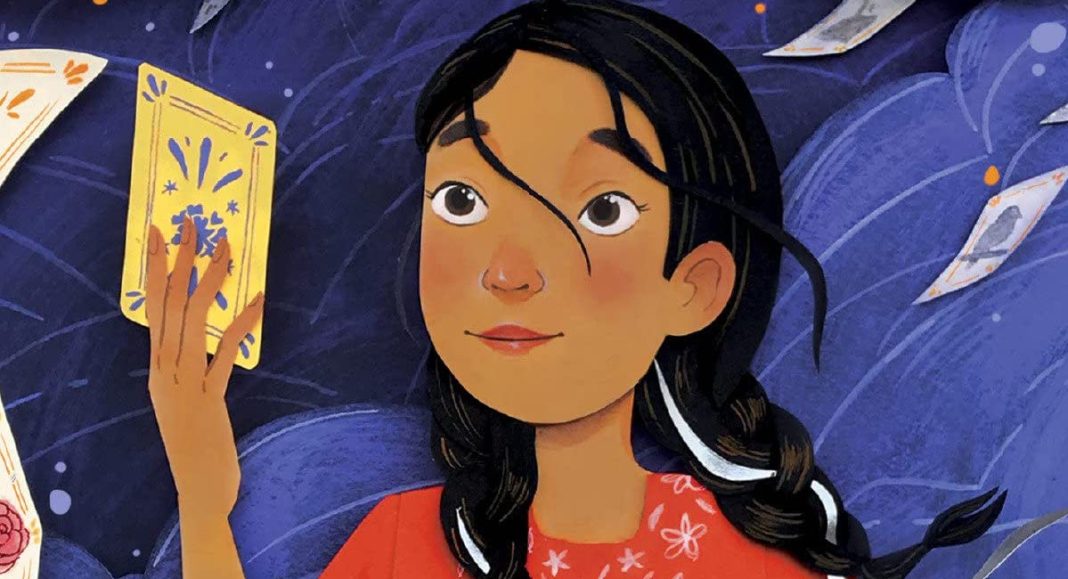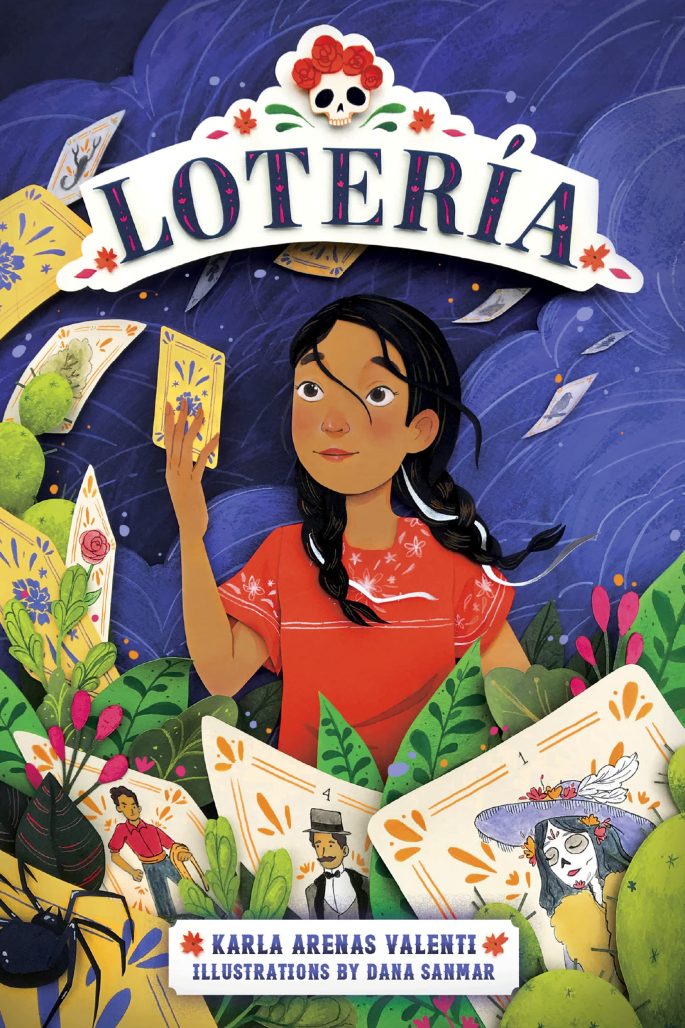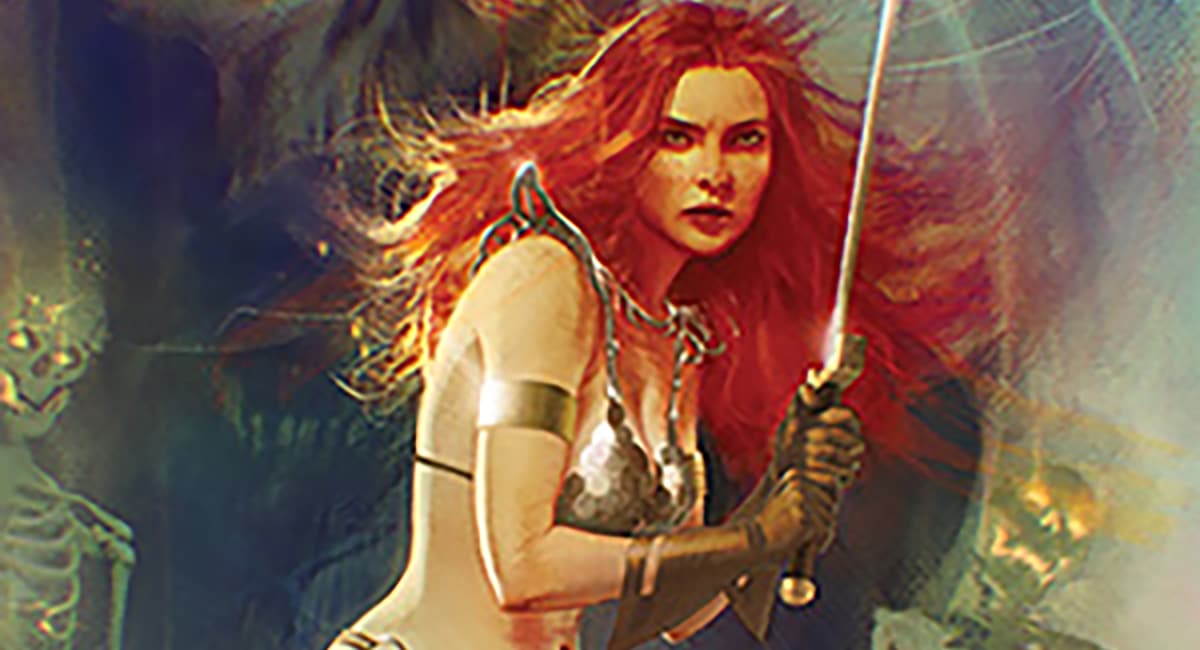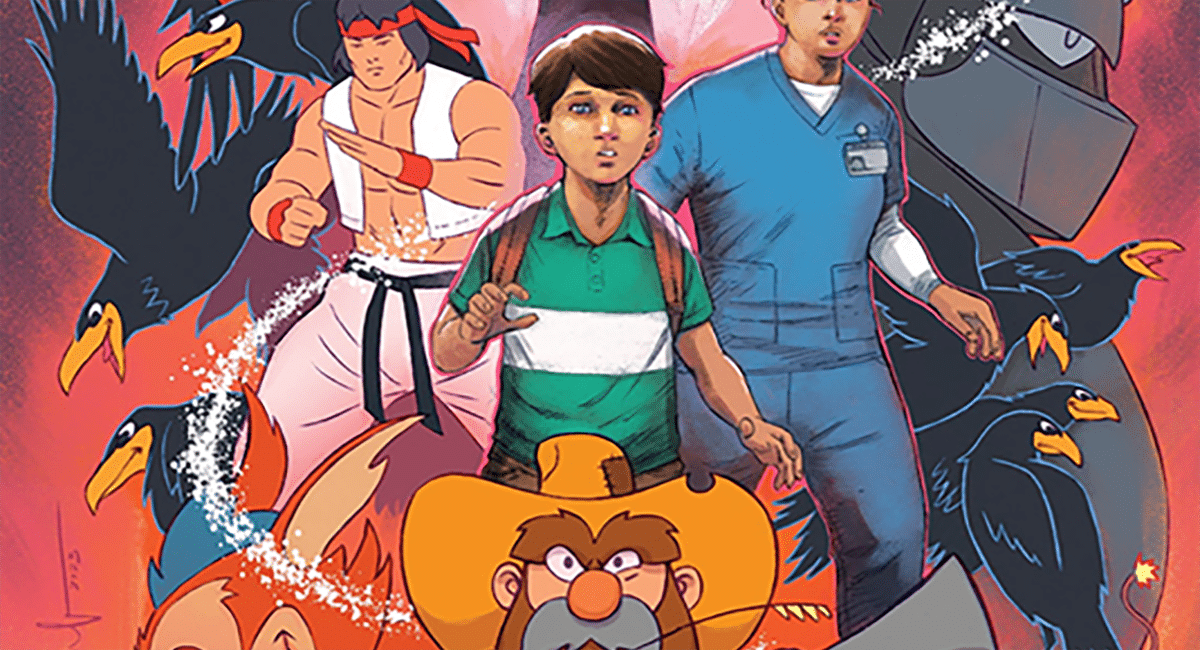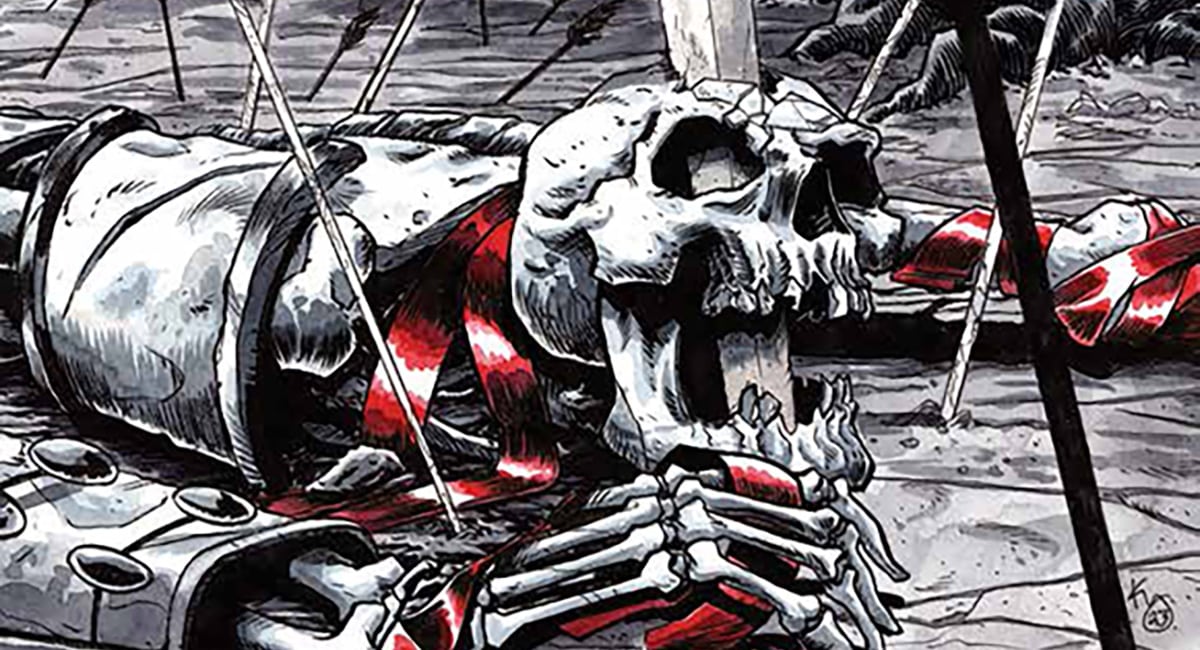By William Quant
Writing diverse stories involving race, culture, and heritage can be a delicate subject in some circles, but stories surrounding these aspects of identity are doing gangbusters in middle-grade and YA graphic novels. Personally, I’m always on the lookout for stories like these because these are the kinds of stories that I wish someone had written for me as a kid.
The Beat spoke with Karla Arenas Valenti, writer of middle-grade novel Loteria, which has been named by People as one of their best children’s books of 2022. The book, which is illustrated immaculately by Dana Sanmar, is dripping with Latino influences without necessarily being about being Latino. We talked with Valenti about crafting nuance in diverse stories, how fairy tales are still relevant today, and more.
William Quant: In your words – not the publisher or on the back of the book – what is Loteria?
Karla Arenas Valenti: Loteria is actually a book about free will versus fate, packaged as a middle-grade adventure. So really what I’m trying to do is trick people into thinking big ideas, big questions. Do we have free will? Is everything predetermined? Do we get to make choices every day? What if we really are an avatar in some metagame? In this case the game is Loteria, a board game. But really at the core of it, it’s a philosophical question.

Quant: I love it because it also plays into what I was going to ask next. No creator is an island and everything influences everything. So is there any genre or work that inspires Loteria that is completely outside its genre or medium?
Valenti: I don’t know if this is a good answer, but definitely philosophy and just identity and the human condition. Understanding who we are, why the way we are, what has led us to become those people? We were talking on an earlier panel about diversity and cultural background and writing stories that are not about that, but using that as the influence that shapes why I think about the world the way I do. So I would say philosophy and human theory for sure.
Quant: Expanding on that, when you make a story about, you know, if you’re not from here, or you’re from here but your family is not – what is the core of that story to get that message across and relate it in a way that anyone can look at?
Valenti: All stories at their core, I think, are stories about identity. But not “I’m Mexican” or “I’m Jewish” or whatever. It’s “I am me.” The question is, how did I get there? [Loteria] is a transformation journey. It takes you from identity A to identity B. Your culture, my culture, shapes the path I take, the choices I make, the people I encounter. The journey that I take is shaped by my culture, but it isn’t about my culture.
It’s not like [Lotaria] is about being Mexican. It’s about solving problems and figuring out free will in a setting that is heavily influenced by Mexican culture. And the other thing that I think is really important, especially if you’re writing diverse stories, is showcasing that people are nuanced. There isn’t a black and white, there isn’t one answer. There isn’t like a profile. The point of writing a story like this is showing people there’s a lot of complexity, there is a lot of uncertainty, there is no answer that clearly tells you ‘Oh, this is what it’s like to be Mexican.’ Mexicans are very unique and different and complicated and complex. Diving into a story like that gives you aspects of all of them.
Quant: Yes, please. We’re not a monolith.
Valenti: Exactly. Even within a culture, we’re not a monolith, right? I’m a white Mexican. And what does that look like? It’s like well, it looks like me. I was shaped by as much the Spaniard influence as I was by the native Mexican influence. But that’s part of my identity.
Quant: Yeah, breaking down nuances is a thing. People may say “tap into the Latin American market.” Okay, but there’s like 30 countries that make that up and and this country is not like that country and so on.
Valenti: In the end, we’re all solving the same problem. We’re all asking ourselves the same question. So just because you’re from one country or another doesn’t mean that question is going to change. What changes is how you go about finding out the answer and that’s where my cultural values matter. The history of where I come from matters. What I grew up eating matters.The music I listened to matters. That’s your culture.
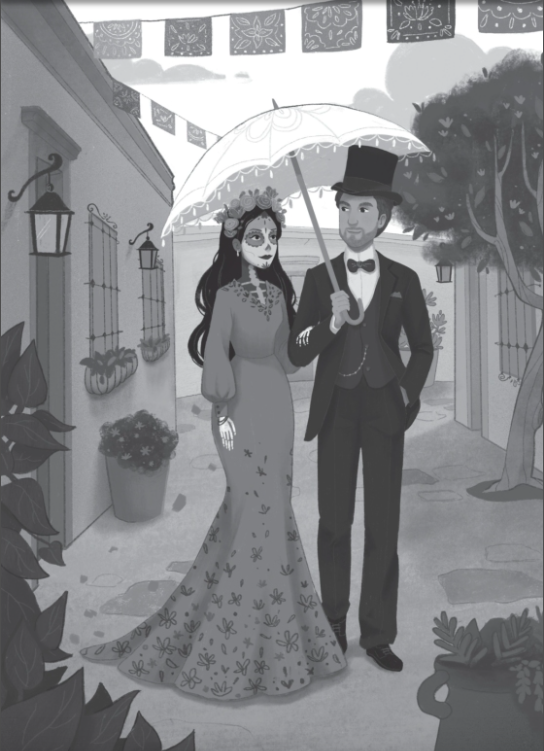
Quant: Speaking of looking to where we come from, Loteria has themes from fairy tales. When it comes to olden fairy tales, or what fairy tales come from, how are they still important today? I mean, they are culture. But how do you think they’re still important?
Valenti: What’s interesting about fairy tales is they’re a very good device, like a good structure, to tell any story. They have key components that I think are familiar to a lot of us that allow us to tell a very unique story. Loteria could be seen as a fairy tale. It has dragons and villains and it has “the hero”, but it doesn’t have your traditional “once upon a time” beginning or your traditional “happily ever after” ending – spoiler. But we’re using these motifs, plunging ourselves into a different world and exploring complicated beings. Modernized fairy tales I think resolve things too easily. Original fairy tales, the whole point of them is: life is messy. We have to navigate it and get messy ourselves and there’s value in telling stories like that.
Quant: Like you said, modern fairytales may do a great disservice to the original source material. How do you keep the sort of fairy tale motifs and themes and channel it toward a younger audience without writing down to them?
Valenti: I want to hold onto that because I think that’s critical, not writing down to your audience. The olden fairy tales, I mean, they have their misgivings, too. But they were written for adults and so in a way, when we access those stories, we’re talking about difficult topics. Part of it is the fairy tale structure allows you to go deep and to go scary and to go dark, but then also have familiar patterns that as a reader or somebody who’s immersing yourself in that experience, you’re like, ‘I’m confident that I will get to the other side, this author isn’t going to lose me in this story.’
Loteria is an example. There are very familiar structural patterns to it, so when you dive in, you might be dealing with ideas you’ve never thought of, or you might be plunging into a culture or a country that you’ve never been to. But you’re like, oh, I recognize what’s happening here. This is about a young girl who’s setting off on a quest or a journey, and there are certain markers that you identify, but allow you the reader to say ‘I’m willing to take a leap of faith, I might take a risk and follow her down this path.’ I think that’s a good way to explore complicated topics and to not talk down to your readers to say we’re going to do something difficult, but it’s going to be guided, I will lead you there. There’s going to be a resolution and you’re going to be better for it. You’re going to be transformed for having gone on this journey with me. That’s what fairy tales are in a way. They are about transformation.
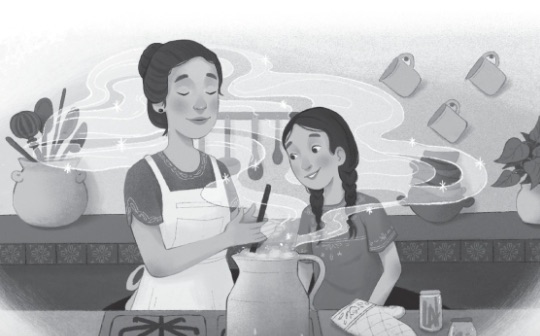
Quant: I don’t know if this is how you’re supposed to interpret it, but Hayao Miyazaki did once say “To expand your audience, you must betray their expectations.” This is what I think he’s talking about. What he meant by that wasn’t exactly to reach a bigger audience but how to expand your audience, from the inside.
Valenti: Challenge their mind, challenge their heart, and you do it exactly that way. I love that quote, thank you, I’m gonna hold on to that. Because to challenge expectations that’s where growth comes, right? I’m not giving you something that you’ve already consumed, or know or are familiar with. I’m saying, let’s go, let’s use what you already know and are familiar with and I’m going to take you somewhere that’s going to pull you out of that. That’s the challenge of the expectation: force you to reconcile what you’re seeing with what you thought you knew and in that reconciliation is growth. That’s where you change as the reader. That’s where you transform, because now, you are forced to look at something that you had never seen before, or come to terms with something you’ve never seen. That’s powerful, right? And that’s when we’re not talking down to our readers. Because we’re saying you’re capable, you are strong enough to go through this transformative journey, even if it’s in a tiny little nugget, but I believe in you. I think we do a lot of disservice to readers when we’re not willing to take them there and just feed them the story that they expect they’re gonna get.
I was trying to do a lot of that with Loteria, really break expectations. Breaking expectations in terms of how the story actually unfolds, breaking expectations in terms of a heroine who’s not exceptional. She’s very ordinary. In fact, she’s the only ordinary one in her family. That’s unusual, but yet she’s still capable of going through an extraordinary journey.
Quant: What’s the biggest thing that you felt going from ‘I’m trying to write, doing the writing thing,’ to ‘I am writing for a big publication?’
Valenti: Validation. Having people actually read it and be like, “oh, this is good.” I’m like “is it? Because I thought it was, but I’ve been working on it for 10 years, so I’m glad that you think it’s good.” That was it for me.
Published by Alfred A. Knopf Books for Young Readers, Loteria is available now.


